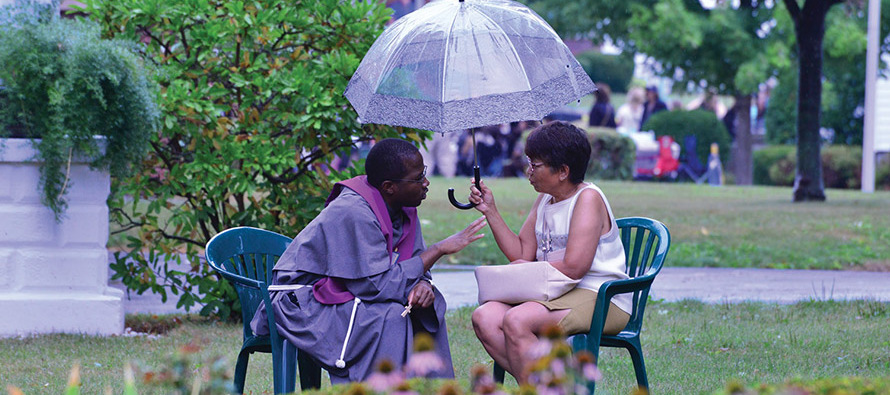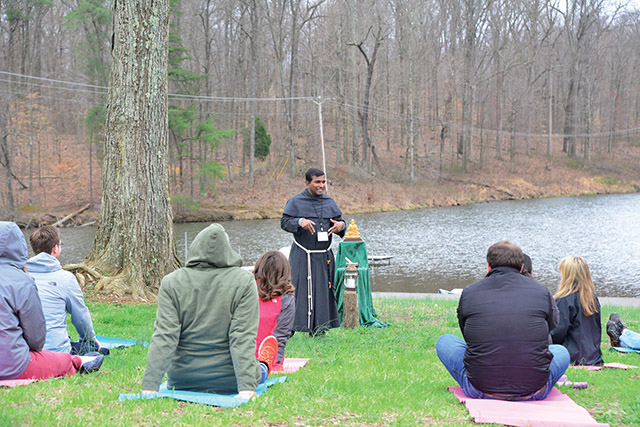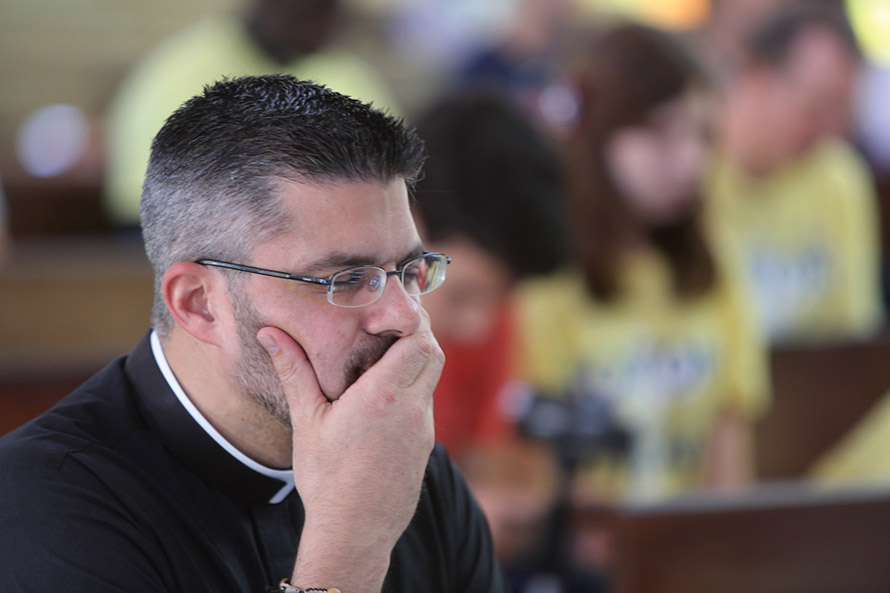What it takes to be a good priest

Priests need to embrace the human condition with eyes of faith, finding God amid their own weaknesses and those of others. Here, Father Ryan Mutayomba, O.F.M.Conv. celebrates the sacrament of Reconciliation at the Basilica and National Shrine of Our Lady of Consolation in Carey, Ohio. (Photo courtesy of the Conventual Franciscan Friars)
YEARS AGO I was at a reunion of extended family members I don’t often see. While talking to my cousin and her husband, their 7-year-old came and sat on his lap. At a break in our conversation, little Megan leaned toward me and said: “You’re the priest, right?”
“That’s me.”
“Good,” she said, and her eyes flared with anticipation. “Tell me everything you know about God.”
I was overwhelmed by the wonder and hunger of this 7-year-old. Of course, there was not enough time—now or then—to tell her everything I knew about God. And her asking reminded me that what I know about God will always be quite limited. But as a priest I’m committed to learning all I can about our God and then sharing it with others, especially through the sacraments.
To be a good priest starts first and foremost with that relationship with God—to learn and experience as much as possible, to love and be loved by a God who is both immanent—with us—and transcendent—beyond us. It’s an ongoing and life-giving process with many facets, and it always begins with prayer.
Prayer and preaching
Prayer is the anchor for any priest. His personal prayer is a time of solace and silence in God’s presence. It is also a time of words—words spoken in the manner that best nurtures that priest’s relationship. The crucial element is that the priest actually spends time in personal prayer. It might seem odd to make this point, but the constant demands of ministry and the many occasions for public prayer can easily cut in on one-on-one time with God.
When the late Cardinal Joseph Bernardin was archbishop of Cincinnati, he came to realize—through the help of three young priests—that he needed more quality time with God. He decided to dedicate the first hour of each day to prayer and meditation. With all the demands of being a shepherd to a large flock, it was that hour, he later wrote, that sustained him throughout the day and made him a good priest and bishop.
Personal prayer always informs and enriches public prayer, and vice versa. For a diocesan priest, the ancient regimen of psalms and prayers in the Liturgy of Hours is primarily a private prayer. For priests who belong to a religious order, it is a prayer prayed with members of his community. The Liturgy of Hours is the prayer of the church, a linchpin to other public prayers and liturgies, and it is essential for priests in developing a deeper relationship with God.
The most common and important prayer in the life of a priest is the Eucharist. It is here that the priest stands most noticeably in persona Christi, “in the person of Christ.” No one can be a good priest without realizing the centrality of the Mass to our faith and celebrating its sacred mysteries with care and thoughtfulness. I find it humbling and awe-inspiring to preside at the Eucharist.
When he celebrates the Eucharist, a priest must be prepared to give homilies rooted in wisdom and inspiration in a manner that is most him. The good priest realizes these few minutes can be so very important in the life of a congregation. They cannot be taken for granted. To be a good priest you must make an effort to be a good homilist. This comes from the fruit of prayer—both private and public—and a commitment to work at it.

The right stuff
Certain attributes and attitudes help a person make the most of priesthood. First is an openness to growth. We are a pilgrim church and people, and a priest must be open to walking where God beckons. A priest will be called upon to take on new ministries in new places. At times he will find great success and other times utter failure—and he needs to learn from both. Ordination is not an end but a beginning to grow in new ways. Growth can be exciting and painful, and a priest has to meet that opportunity with an openness of mind and heart.
A second attribute of an effective priest is embracing the human condition with the eyes of faith. Priesthood involves joyfully celebrating new life at Baptisms and weddings, and sharing the grief of those who mourn the loss of loved ones. Priesthood calls you to be with the infirm and imprisoned, the poor and the rich, with those whose faith is strong and those who live in doubt. A priest is drawn into church and social conditions he can’t control. He might minister in a setting of growth and expansion, or one of diminishment, mergers, and closings. He might be assigned to a rural parish, one in the inner city, or one in a burgeoning suburb. He might need to learn a new language and culture or labor on through scandals and setbacks that are not his doing. Through all the highs and lows, he must see God’s grace at work in the world with his sights set on the Kingdom and its fullness.
Generosity is another key attribute. “The best priests I know share the virtue of generosity,” says Bishop John Stowe of the Diocese of Lexington, Kentucky. “Their world is bigger than themselves, and they are truly dedicated to ministry.” These priests realize ministry is not about stroking their own egos but about caring for souls. “A healthy self-understanding and a generous spirit,” says Stowe, “are the real marks of greatness and excellence.”
While the effect a priest has on the lives of so many can seem daunting, a sense of humor is essential to keep everything in perspective. It’s healthy to laugh, and a priest needs to be able to laugh at himself and at the joys and absurdities of the world. It might be a comment from an uninhibited child or a wisecracking senior. To laugh is to acknowledge a gift from God and admit our own human foibles and limitations.
A good priest must be at home in his own skin. This allows him to be content with his time alone, treasuring the quiet he has to himself whether he wants it or not. He must know—and accept—his strengths and weaknesses.
“To be a faith-filled priest, one must be aware of not only his gifts but also areas of growth—and not be afraid to admit them to himself and others,” says Father Miguel Briseño, O.F.M.Conv., pastor of Our Lady of Mount Carmel in El Paso. “He must have a willingness to listen to others and be present to them.”
Don’t go it alone
Good priests have a capacity for friendship. Family and friends help put everything in proper perspective. I have found great support in visiting and vacationing with college friends and others who know me apart from my ministry. The same holds true of my family. My parents and siblings, their spouses and children have kept me rooted in who I am, sometimes quite pointedly. One time my mother announced to the family that because I was elected vicar provincial (leader of a section of my religious community), I had a new title, Very Reverend. One of my brothers responded, “We’ll just call him the Very Jim.”
These relationships with family and friends, peers and mentors are indispensable for living a happy celibate life. A good priest avails himself of and nurtures this intimacy. It is so important to his life of celibacy. To grow in trust with another mirrors that trust and intimacy he has with God.
A final attribute of a good priest is dedicated service to others. “A deep sense of service to the church and all people, along with a deep faith, is what lies at the basis for meaning in this very special vocation,” says one of my fellow Franciscan priests, Father Tom Merrill, O.F.M.Conv. “Nothing gives me greater joy than to have served others, especially at a significant or difficult time in their lives when they were at a crossroads.”

A channel of God’s grace
All priests have occasion to serve others and in so doing be reminded of how God works through them. This truth hit me profoundly in the second year of my own priesthood. I received a call late at night to come to a hospital in a distant town to help a family deal with a death.
When I arrived, I was met by two doctors who filled me in on the situation. Earlier that evening a 13-year-old girl had died quite suddenly from a tumor. The family was so distraught they refused to allow the hospital staff or funeral director to do anything else until a priest came. With the local pastor out of town, it took four hours to locate a priest, so they were glad when I arrived.
These doctors introduced me to the family. We talked for a while and then went into the room where their daughter lay. We prayed together and silently. I blessed and anointed the body of this 13-year-old, and we prayed some more. Eventually, we went back out into the family area. They talked about their daughter’s life and all she had meant to them. After a couple of hours, they felt comfortable enough to allow the hospital to move forward. I said good night and prepared to leave.
The two doctors were still there and walked me out to my car. Once in the parking lot I turned to them and said, “I must tell you something. On behalf of the family and the church I want to thank you for being there with this family in their time of grief. I know you could have been home with your own families hours ago, and I appreciate your going above and beyond the call of duty. It was such a comfort to them.”
The physicians nodded, and one of them took my forearm and said, “Your words are very kind, but let me say something to you. As doctors we get to do some amazing things. We help people overcome diseases and ailments and return to full health. Sometimes we even resuscitate people and bring them back from death. But no matter what we do, eventually all of our bodies are going to wear out. What we do—however good—is only temporary. But what you do as a priest is about tending to the soul. And that’s eternal. So we thank you for what you do.”
Chills ran down my spine at his words. And I understood quite clearly and distinctly what this doctor had said—and not said. He did not say that I, Father Jim, had all the right things to say to this family and did all the right things. Not at all. What he was saying was that what I represent in the person of Jesus Christ speaks much more powerfully than anything I can say or do. It reminded me of the awesome honor and responsibility of what it means to be a priest. To be of service to others is to be a conduit of God’s grace, and that is the heart of this special vocation.
Answer the call
Writer and speaker Gil Bailie tells the story of a priest friend who, newly ordained, lived with an elderly priest.
“At breakfast one morning my friend asked him, ‘Father, when did you decide to become a priest?’ The old priest said, ‘When I got up this morning.’ “
Priesthood begins by answering the call. Not only the call to enter seminary or formation but to keep answering that call every day of one’s life. While priesthood calls us to reveal God’s presence to others, priests also know that God always stands before and behind and beside them. A priest is never acting alone, never relying entirely on his own attributes, for God’s continuing miracle is to fill the world with grace by working through human hands.
A version of this article originally appeared in VISION 2007.
Related article: VocationNetwork.org, “On the road to priesthood in the company of a faithful God.”
Tags
Related
- Taking a chance on God: Profile of Father David Gutierrez, C.M.F.
- About-face to the priesthood
- Moved by the power of the Eucharist: Profile of Father Duy Henry Bui Nguyen, S.C.J.
- No regrets: A grateful priest takes stock
- We’re different—in a good way: Profile of Father Roberto Mejia, O.Carm.
- Man with a mission
- Monastic life is habit-forming
- Ministering to migrants in a carport cathedral
- Connections make the man: Profile of Father Kevin Zubel, C.Ss.R.
- A priest (who’s been there) responds to the pain of addiction Read More
Most Viewed
- Find your spirituality type quiz
- Questions and answers about religious vocations
- Celibacy quiz: Could I be a nun? Could I be a brother? Could I be a priest?
- Resources for older discerners or those with physical and developmental differences
- About Vocation Network and VISION Guide


